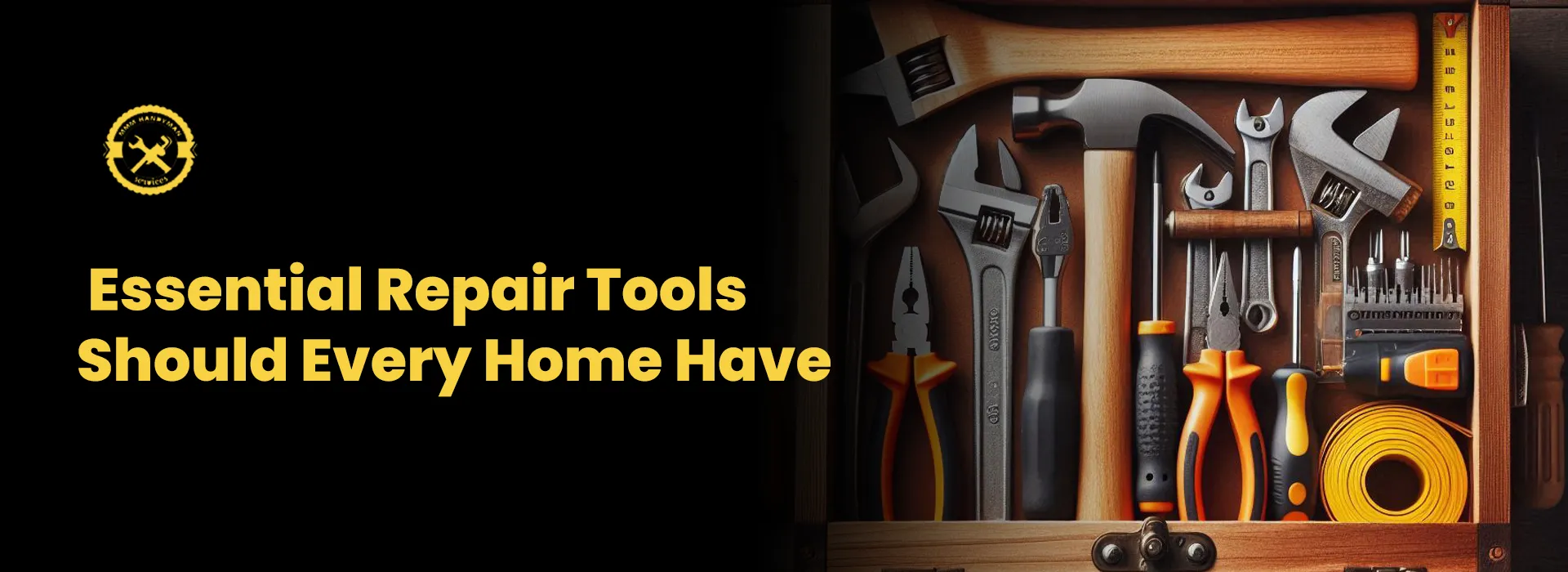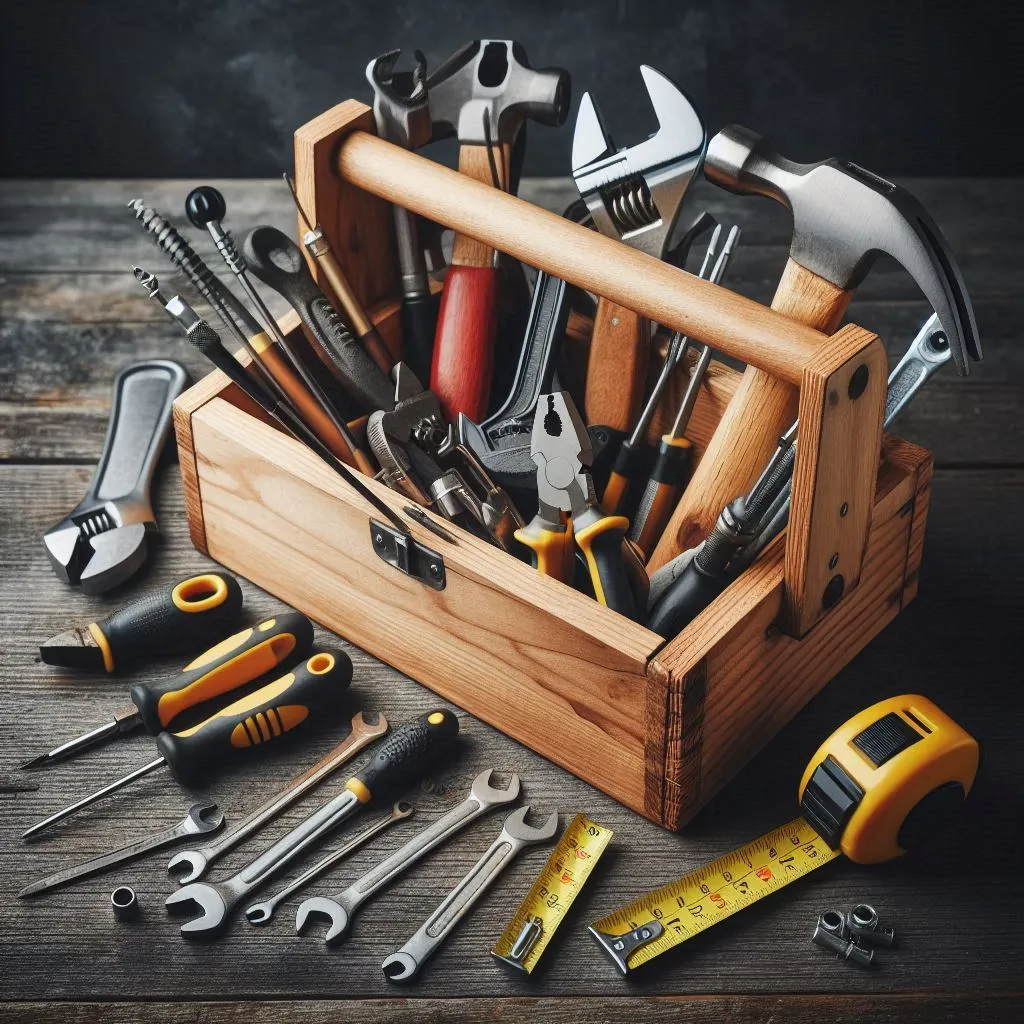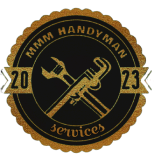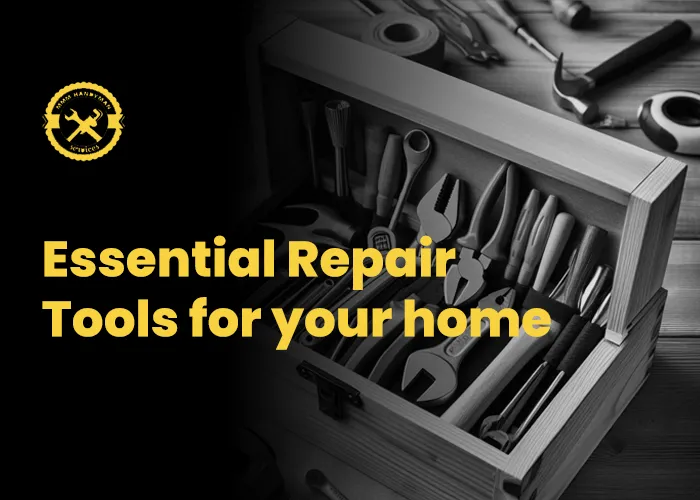
What Essential Repair Tools Should Every Home Have?
very home will eventually face the need for small or significant repairs. These could range from installing a screw and adjusting cabinet doors to fixing pipes or addressing electrical issues. Having the right tools not only simplifies these tasks but also reduces the cost of hiring a technician. In this article, we’ll introduce the essential repair tools every home should have, ensuring you’re prepared to tackle any problem that arises.
Table of Contents

1. Hammer
A hammer is one of the most basic and versatile tools for any home.
Uses: Driving nails, removing boards, or even flattening surfaces.
Recommendation: Choose a hammer with a rubber or wooden handle for better grip and an appropriate weight for household tasks.
2. Screwdrivers (Flathead and Phillips)
Screwdrivers are indispensable for assembling, adjusting, or repairing household items.
Uses: Tightening and loosening screws in appliances, furniture, and decorative items.
Tip: Invest in a set with various sizes or opt for a multi-bit screwdriver for versatility.
3. Pliers
Pliers are multi-functional tools useful for gripping, bending, or cutting materials.
Uses: Holding and twisting metal objects or cutting wires.
Types to Have: A standard pair of pliers and needle-nose pliers for more precise tasks.
4. Adjustable Wrench
An adjustable wrench is ideal for handling nuts and bolts of various sizes.
Uses: Tightening or loosening bolts, especially in plumbing repairs.
Tip: Choose a high-quality, adjustable wrench for better durability and precision.
5. Measuring Tape
Accurate measurements are crucial for any home project.
Uses: Measuring spaces for installing shelves, curtains, or furniture.
Recommendation: Get a retractable tape measure with a locking mechanism and at least 5 meters in length.
6. Hand Saw
A hand saw is essential for cutting wood or lightweight plastic materials.
Uses: Trimming wood for furniture repairs, shelf installations, or DIY projects.
Tip: Opt for a saw with a sharp blade and ergonomic handle for easy use.
7. Electric or Cordless Drill
A drill is a more advanced tool that makes installing and repairing items much faster.
Uses: Drilling holes into walls or tightening and loosening screws.
Recommendation: A cordless drill is more convenient for use in various parts of the house.
8. Adhesives (Duct Tape and Hot Glue Gun)
Adhesives are simple yet effective tools for quick fixes.
Duct Tape: Useful for temporary fixes like sealing leaking pipes or joining parts.
Hot Glue Gun: Perfect for decorative tasks or small repairs involving plastic or wood.
9. Plumbing Tools
Plumbing issues like leaks or clogs are common in homes. Essential plumbing tools include:
Pipe Wrench: For tightening or loosening pipe fittings.
Drain Snake: To clear clogs in sinks or toilets.
10. Flashlight or Headlamp
Proper lighting is crucial during repairs, especially in dimly lit areas.
Uses: Working under sinks, in closets, or during power outages.
Tip: Choose a flashlight with strong illumination and long-lasting batteries.
11. Level
A level is a must-have for ensuring straight and balanced installations.
Uses: Installing shelves, picture frames, or curtains evenly.
Recommendation: A compact, lightweight level is ideal for household tasks.
12. Utility Knife or Cutter
A utility knife is essential for cutting materials like cardboard, plastic, or cables.
Tip: Choose a knife with a sharp, replaceable blade and a safe grip.
13. Foldable Ladder
For tasks that require height, like changing light bulbs or accessing upper cabinets, a sturdy ladder is indispensable.
Tip: Invest in a foldable, durable ladder for easy storage and safety.
14. Toolbox
To keep your tools organized and easily accessible, a toolbox is a must.
Features to Look For: A box with compartments and a lightweight design for portability.
Why Are Repair Tools Important?
Having the right tools at home not only saves money but also provides a sense of independence and confidence. With the proper tools, you can complete repairs more accurately and safely, ensuring a well-maintained home.
Final Tips
- Clean and store your tools properly after each use to extend their lifespan.
- Research specialized tools for specific repairs or consult professionals when needed.
- Always prioritize quality and safety when purchasing tools, as inferior tools can pose risks and lead to ineffective repairs.
With these tools, you’ll be equipped to handle most household repairs efficiently, creating a more organized and prepared home.

